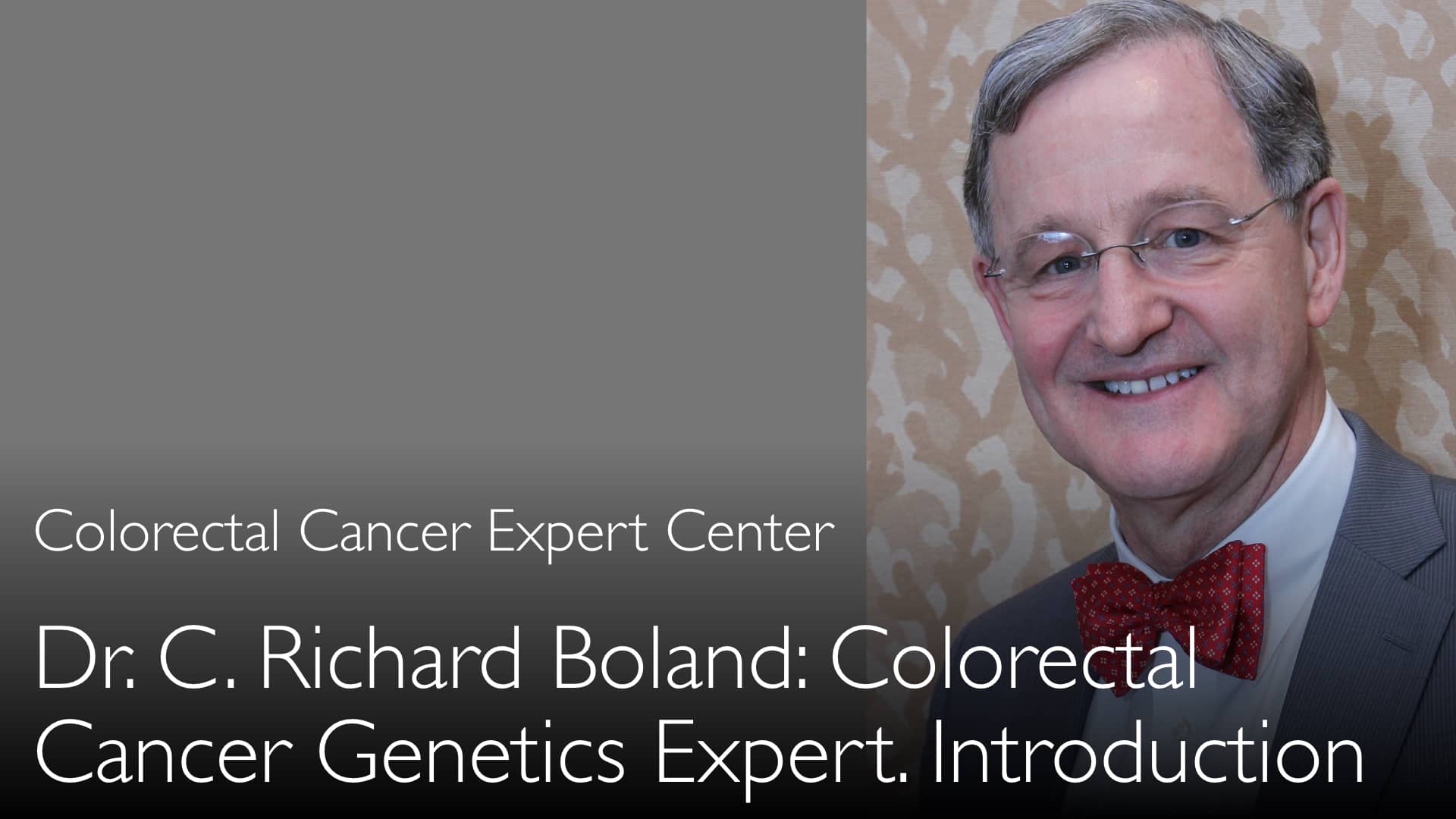消化器病学および大腸癌スクリーニングの権威、C. Richard Boland医学博士が、血液や便検体におけるマイクロRNAバイオマーカーの活用が、早期大腸癌の発見にいかに非侵襲的な有望な手法をもたらすかを解説します。現在の便検査の課題を踏まえ、マイクロRNA解析が前癌性ポリープや早期腫瘍の検出感度を飛躍的に高め得る理由について考察します。
マイクロRNAバイオマーカー:非侵襲的大腸癌スクリーニングにおける画期的進展
セクションへ移動
- 大腸癌検出におけるマイクロRNA
- 現行大腸癌スクリーニング法の限界
- マイクロRNA検出のための便検査と血液検査の比較
- DNA検査に対するマイクロRNA解析の利点
- 癌発症前の前癌病変の検出
- 大腸癌スクリーニングの将来展望
- 全文書き起こし
大腸癌検出におけるマイクロRNA
C・リチャード・ボーランド医学博士は、大腸癌腫瘍内に存在する微小な遺伝子分子であるマイクロRNAが、血液や便の検体から検出可能であることを明らかにしました。これらのバイオマーカーは、非侵襲的な大腸癌スクリーニングに革新的なアプローチをもたらします。マイクロRNAが便検体中で安定して存在するという発見は、研究者たちを驚かせました。当初、これらの分子は便中では検出できないほど壊れやすいと考えられていたためです。
現在、米国や欧州の複数の企業が、早期大腸癌検出を目的としたマイクロRNAパターン解析を用いた商業検査を開発中です。C・ボーランド医学博士は、これらの遺伝子シグネチャーが悪性腫瘍だけでなく、前癌状態の腺腫にも現れることを強調し、予防的スクリーニングに理想的だと述べています。
現行大腸癌スクリーニング法の限界
C・リチャード・ボーランド医学博士が指摘するように、従来の大腸癌スクリーニング法には重大な課題があります。グアヤック便潜血検査や、より新しい便免疫化学的検査(FIT)には、感度と特異度の面で限界があります。これらの血液ベースの便検査は、痔核や歯肉炎などの非癌性出血源による偽陽性を生じる可能性があります。
C・ボーランド医学博士は、便検体の自己採取と郵送を必要とする現行の方法が、遵守率の低さという問題に直面していると説明します。多くの患者がこの過程を不快に感じ、大腸癌が早期発見時には最も予防可能な癌の一つであるにもかかわらず、スクリーニング参加率の低下を招いています。
マイクロRNA検出のための便検査と血液検査の比較
便中のマイクロRNA解析が有望である一方、C・リチャード・ボーランド医学博士は、血液ベースの検査が最終的には患者にとってより受け入れられやすい可能性があると示唆します。血液検査は便採取に伴う遵守の障壁を取り除き、同等の検出能力を提供できるかもしれません。
しかし、便検体の提供に同意する患者については、ボーランド博士は便ベースのスクリーニングにマイクロRNA解析を含めることを強く推奨しています。各細胞が2コピーのDNAに対して複数コピーのマイクロRNAを含むため、これらの分子はDNA変異よりも強力な生物学的シグナルを提供すると説明します。
DNA検査に対するマイクロRNA解析の利点
C・リチャード・ボーランド医学博士は、DNAベースの検査アプローチと比較したマイクロRNAバイオマーカーの技術的優位性を強調します。一部の企業は便免疫化学的検査にメチル化DNAやKRAS変異解析を組み合わせようと試みていますが、ボーランド博士はこのアプローチを不必要に複雑だと考えています。
「マイクロRNAは測定が非常に容易であるべきです」とボーランド博士は説明します。細胞内でのマイクロRNAシグナルの自然な増幅は、早期癌検出の特に敏感なマーカーとなります。この増幅効果により、現行法よりも早期の腫瘍同定が可能になります。
癌発症前の前癌病変の検出
C・リチャード・ボーランド医学博士によれば、マイクロRNAスクリーニングの決定的な利点は、悪性化する前の前癌腺腫を同定できる能力です。現行の便潜血検査は出血段階まで進行した癌しか検出できず、予防の最適な機会を逃すことが多いです。
「大腸ポリープは完全に悪性化する前でも、これらの異常なマイクロRNA遺伝子シグネチャーを示します」とボーランド博士は指摘します。この能力により、癌発症前の危険なポリープ切除を可能とし、大腸癌スクリーニングを早期発見から真の予防へと転換しうるのです。
大腸癌スクリーニングの将来展望
C・リチャード・ボーランド医学博士は、マイクロRNA解析が大腸癌スクリーニングプログラムで標準となる未来を構想しています。大腸異常に対して高感度かつ高特異度であり、他の消化管源からの偽陽性を減らす検査の必要性を強調します。
研究の進展に伴い、マイクロRNAシグネチャーと他のバイオマーカーの組み合わせにより、スクリーニング精度がさらに向上する可能性があります。ボーランド博士の研究は、数年以内に患者が現行の便ベース法に匹敵する大腸癌リスク評価を、より便利で患者受容性の高い簡便な血液検査を通じて受けられるようになる可能性を示唆しています。
全文書き起こし
アントン・チトフ医学博士: 非侵襲的方法による大腸癌スクリーニングは重要です。新たな敏感な大腸癌腫瘍マーカーが発見されています。便検体及び血液中のマイクロRNA同定は、癌リスクの予測を可能にします。
大腸癌は男女合わせて最も頻度の高い癌の一つです。世界で年間約150万人が大腸癌と診断されています。しかし、前癌ポリープのスクリーニングや大腸癌腫瘍の早期発見により、大腸癌による死亡は完全に予防可能です。
大腸内視鏡検査は大腸癌スクリーニングの標準的方法ですが、より侵襲性の低い方法が開発されています。マイクロRNA同定は非侵襲的大腸癌スクリーニング法の一つです。あなたはマイクロRNAが便検体で同定可能であることを示しました。つまり、大腸癌腫瘍由来のマイクロRNAは、少量の便検体解析による大腸癌早期発見のバイオマーカーとなりえます。
アントン・チトフ医学博士: マイクロRNAは大腸癌スクリーニングにどのように活用できますか?
C・ボーランド医学博士: 血液中でのmiR-21や他のマイクロRNA発見について議論したばかりです。数年前、当研究室の研究員が、大腸癌で発現変動するマイクロRNAが便中に存在する可能性を示唆しました。当初、便検体でマイクロRNAが発見できるとは考えていませんでした。マイクロRNAは便中で分解されやすく脆弱だと思ったからです。しかし彼の指摘は正しく、便検体からマイクロRNAを単離できることが判明しました。
米国に少なくとも1社、欧州に複数社が、便検体解析による早期大腸癌検出法の開発に取り組んでいます。マイクロRNA同定は早期大腸癌発見の一方法です。
従来、早期大腸癌検出には便中血液検出のためのグアヤック試験を使用してきました。現在では便免疫化学的検査(FIT)が主流ですが、癌検出において依然として感度及び特異度の問題を抱えています。
米国の1社が大腸癌便検査にメチル化DNA解析及びKRAS腫瘍変異解析を追加しています。私はこれは過度に困難だと考えます―このような便検体検査を有効に機能させるのは非常に難しいでしょう。マイクロRNAは測定が極めて容易であるべきです。大腸癌便検体検査にマイクロRNA解析を組み込む開始を期待しています。
問題は、多くの患者が便検体採取、郵送、医師への提出を困難と感じることです。患者は単にこれを好みません。したがって血液検査の方が優れています。しかし患者が何らかの便検査を行う場合、マイクロRNA検査を必須とすべきです。
各細胞にはDNA2コピーに対し複数コピーのマイクロRNAが存在します。つまりマイクロRNAでは定義上増幅シグナルを得られます。早期大腸癌検出法に取り組む企業はマイクロRNAを検討すべきです。便中で何かを測定するならば、マイクロRNAがおそらく早期大腸癌腫瘍発見の最も敏感な検査となるでしょう。
C・ボーランド医学博士: これらのマイクロRNAは大腸癌腫瘍のみならず進行大腸腺腫にも存在します。大腸ポリープは完全悪性化前でもこれらの異常マイクロRNA遺伝子シグネチャーを示します。これは非常に画期的な非侵襲的早期スクリーニング法となるでしょう。前癌病変の同定が重要です。便中血液発見は大腸癌が既に相当進行した段階を示唆するためです。
はい、便中血液の別の問題は消化管全域からの出血源となりうることです。歯肉や痔核からの出血もありえます。癌同定に対して非常に特異的な早期大腸癌検出検査が発見されれば、はるかに強力なものとなるでしょう。





